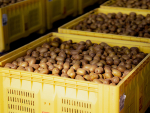Beware the the ‘bok choy effect’.
That warning came from KPMG’s global head of agri, Ian Proudfoot, at the recent Zespri conference in Tauranga.
Proudfoot says the ‘bok choy effect’ is a way of explaining some changes taking place in markets in Asia.
What is changing more is our diet in the west and we as food producers need to recognise and understand this, Proudfoot says. A good example of the ‘bok choy effect’ is seen in Melbourne where a friend of his lives in a Vietnamese suburb.
“Twenty years ago when Zespri was founded he would have been able to go to his supermarket and buy [only] meat and three veg. Today he goes there and buys 30 or 40 different kinds of Chinese greens and a whole range of other ‘inspirational’ products. He says his diet is far better.”
Proudfoot says evolution is coming to the food sector and people are looking at a whole range of future alternatives in the future –possibly even laboratory-created food.
While NZ produces enough food to feed 40 million people, it should look to feed 800 million, he says. This would be possible if our food products became a smaller but high value addition to people’s diets.











